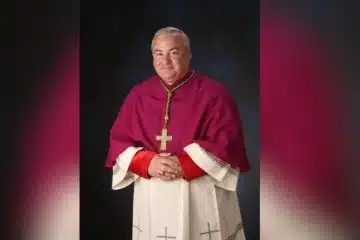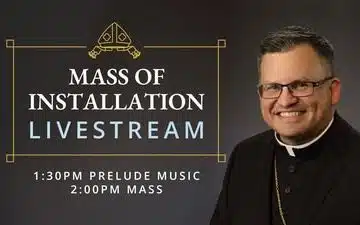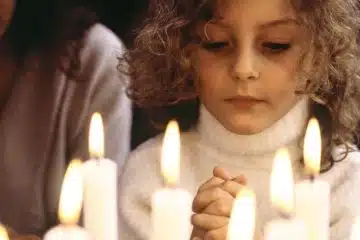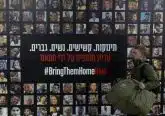Walking in the footsteps of martyrs: Missionaries in today’s El Salvador say it is a holy place
January 11, 2011
By Eileen Connelly
Last December The Catholic Telegraph reported on the series of memorial events commemorating the 30th anniversary of four churchwomen slain in El Salvador on Dec. 2, 1980. But there is an important footnote to that story: In the decades since Ursuline Sister Dorothy Kazel, Maryknoll Sisters Maura Clarke and Ita Ford and lay missionary Jean Donovan were murdered, the legacy of their faith and commitment to the people of El Salvador has been kept alive by other U.S. missionaries.
Delegations from Cincinnati and Cleveland who traveled to El Salvador with CRISPAZ (Christians for Peace in El Salvador) for the anniversary had the opportunity to meet several of these dedicated individuals during their stay and learn how they continue to reach out to the Salvadoran people.
 |
|
| Sister of Charity Peggy O’Neill,, who operates the Art Center for Peace, has served in El Salvador since 1987. (CT PHOTO/E.L. HUBBARD) |
The Cincinnati group visited the colonial village of Suchitoto, site of the Art Center for Peace founded in 2005 under the direction of Sister of Charity Peggy O’Neill, who belongs to the New Jersey-based congregation of St. Elizabeth. The center’s mission, she explained, is to “ build a culture of peace using the arts,” including offering music, English and computer classes and activities for children, along with programs that promote self-sufficiency for women and teach young people the needed skills to resist violence.
“We provide a safe place for the kids to come,” Sister Peggy said.
The tiny country of El Salvador has one of the highest homicide rates in the Americas; street gangs prey on the on the poor and murder indiscriminately, and extortion rackets run rampant. One way the center is responding, Sister Peggy noted, is by working with the youth of outlying communities that are most at risk, providing them with training in conflict resolution and sending them back to share what they’ve learned with the community.
The center’s museum and gallery are a source of pride for the local people and a way to preserve their history and cultural identity. She introduced visitors to one young man from a neighboring village who had been actively involved in conducting research for the museum. She beamed as he confidently led the visitors through the exhibits.
“I’m so very proud of him. He has such poise now. This is the kind of thing the young people need,” Sister Peggy explained.
She has served in El Salvador since 1987, when the country was still in the middle of a 12-year civil war (1980-1992), and has found inspiration in the example of the churchwomen.
“What’s truly amazing,” she said, “is how they poured themselves into what they were doing without fear but with a lot of hope. Their story is an example of how we can be braver and say, ‘If you really want to use me God, here I am.’”
 |
| Salvadoran children like this boy are helped by the programs offered at the Art Center for Peace. (CT PHOTO/ E.L. HUBBARD) |
She recalls accompanying one woman to a local park to retrieve the body of her teenage son, murdered because he was suspected of being a guerrilla supporter.
“I watched her kneel down and kiss her son with, such reverence, and we prayed together,” Sister Peggy said. “It’s an image that’s frozen in my mind.”
Years later, she said, his mother, one of countless parents to bury a child during the war, has not forgotten her son, but is “full of life, hope and gratitude for for her children that live.”
“I’ve been privileged to earn the confidence of people here,” Sister Peggy said with tears in her eyes. “They’ve taught me that you can endure. I don’t stay because we have a nice building. I stay because this is a holy place.”
Ursuline Sister Rose Elizabeth Terrell has also been inspired the faith of the people of El Salvador. She ministers in the rural mountain village of Chiltiupan at Santo Domingo de Gozmas Parish as part of the Diocese of Cleveland’s mission team, which has worked in El Salvador since 1964. The parish’s two priests serve 36 communities and the school has approximately 1,000 students. offering pre-school through secondary education. As parish administrator, Sister Rose’s duties vary.
“I’ve picked up corpses, have been close when babies are delivered and everything in between,” she said.
Sister Rose first traveled to El Salvador in 1974, while fellow Ursuline Sisters Dorothy Kazel and Martha Owen were serving there. She visited again several times over the years, having “fallen in love with the people.” Ready for a change after decades in development ministry, she came to stay seven years ago.
She says Chiltiupan is “very clean, without a lot of drugs, and no gangs, which is unusual for El Salvador. The people are strong and they work hard in the fields growing beans and corn. Some of them walk two hours to get to Mass on Sunday. They’re simple, welcoming and faith fillled. Their faith is always a part of their lived experience. Their response to, ‘How are you?’ is ‘Fine. Thanks be to God.’ When you’re going somewhere, they’ll say, ‘Go with God.’”
For Megan Shea, a senior at Cleveland’s Ursuline-sponsored Beaumont School, visiting Chiltiupan was the most telling part of the trip. The Cleveland group attended Sunday Mass at Santo Domingo and met with the youth of the parish. “I was shocked to hear that the kids my age had dreams similar to mine even though we come from two different worlds,” she said. “They want to go to college and become doctors, business administrators, veterinarians, etc…The potential for all the kids to be something great was phenomenal, but the the likelihood of them ever being able to fulfill their dreams due to the circumstances in which they live is what broke my heart.”
Some young people do have the opportunity to fulfill their dreams through a scholarship program at the parish that enables them to attend college. “For about $500 a year, a student can be educated at UCA (University of Central America). We have 47 students at six different universities in the capital right now,” Sister Rose said. “It’s an adjustment for them, but they’re doing well and we’ve challenged them to give back to the community. They just made baskets of food to take to the elderly poor so they would have something to eat over Christmas.”
Regarding the challenges of her ministry, Sister Rose said, “I don’t stop and think about them too much. I’m the type of person who just does the work God has given me to do and do it the best I can.”
Money is always a challenge, she admitted, as is adequate healthcare. A clinic sponsored by the parish meets parishioners’ daily medical needs, but the children and the elderly are particularly fragile.
“There’s one little boy with a congenital condition who can’t walk or talk and can barely sit. The doctor has seen him, but isn’t sure what’s wrong. I’d like to be able to do more for him, she said.”
People like the young boy and his family are what drew Sister Rose to the still-scarred nation and it is what keeps her there. “It was the people that kept the churchwomen here, too,” she said. “We make sure they are remembered, because they are part of the history of the country and gave their lives for the Salvadoran people.”
It isn’t uncommon for first-time visitors to El Salvador to form a bond with the people then choose remain there in ministry. Such was the case with Carmelite Father David Blanchard who participated in a CRISPAZ trip 26 years ago and has served there since. He is the longtime parish priest at Our Lady of Lourdes Parish in the community of Calle Real. The parish covers an area of 16 square kilometers with some 40,000 inhabitants.
 |
| A Salvadoran man holds up a sign paying tribute to the four U.S. churchwomen murdered in El Salvador in December 1980. He was visiting the memorial wall in San Salvador, the country’s capital, which lists the names of thousands of innocent civilians killed during the civil war. (Courtesy Photo) |
In addition to addressing the pastoral needs of his parish, Father Blanchard has also focused on the development of numerous projects geared toward the self-suffiency of its members, with opportunities to assume responsibilty and leadership roles in the community. Among them is a youth center that provides a place for young people “to hang out and avoid the gangs,” Father Blanchard said, and a new pychiatric clinic that will provide direct counseling services for those who have been physically or sexually abused.
Other services provided by the parish are several health clinics, a dental facility and a lunch program for the elderly. At a nearby farm members of the local community can learn agricultural techniques that enable them to grow their own crops using bags of soil, since the locale is one where cultiviation would normally be impossible. Animal husbandry is also taught.
Father Blanchard introduces visitors to Luis, whose life as been transformed through programs offered at the parish. Recruited into the gangs as a teenager and a witness to his sisters being abused, Luis was once prone to violence. Through counseling and his work on the farm, he has since become a productive employee and gentle caregiver to the goats.
Mindful of the example of the missionaries’ dedication and perservence, both past and present, Stephanie Schuckmann, a staff member at Cincinnati’s St. Ursula Academy, has shared the delegation’s experiences with several junior and senior religion classes at St. Ursula since her return. She is also planning to host a talk about the trip for interested alumnae and hopes to partner with CRISPAZ to coordinate a trip for graduates and encourage the school’s community service department do the same for students.
Schuckmann explains how the four churchwomen and El Salvador’s other martyrs — San Salvador Archbishop Oscar Romero, assassinated in 1980, and the six Jesuit priests their housekeeper and her daughter, who were murdered in 1989 — “act as current-day examples of what we are called to as Christians, which is awe-inspiring under such violence and, on a basic human level, within our reach if we choose. They struggled with fear, yet remained firm in their solidarity and love for the Salvadoran people, courageously picking up the cross of Jesus and following Him. I’ve been challenging others to think about that in their own lives.”
Sister Eileen Connelly can be reached at: [email protected].













